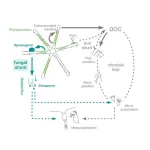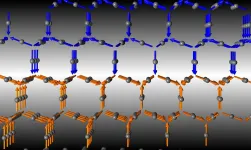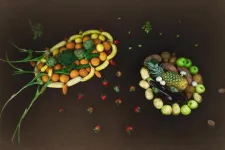(Press-News.org) The new drug sotorasib reduces tumor size and shows promise in improving survival among patients with lung tumors caused by a specific DNA mutation, according to results of a global phase 2 clinical trial. The drug is designed to shut down the effects of the mutation, which is found in about 13% of patients with lung adenocarcinoma, a common type of non-small-cell lung cancer.
The Food and Drug Administration approved sotorasib May 28 as a targeted therapy for patients with non-small-cell lung cancer whose tumors express a specific mutation -- called G12C -- in the KRAS gene and who have undergone at least one previous therapy for their cancer.
Non-small-cell lung cancer makes up over 80% of all lung cancers. More than 200,000 new cases of non-small-cell lung cancer are diagnosed annually in the United States.
The study, led by researchers at Washington University School of Medicine in St. Louis, Perlmutter Cancer Center at NYU Langone Health in New York, MD Anderson Cancer Center in Houston, and Memorial Sloan Kettering Cancer Center in New York, will be presented June 4 at the annual meeting of the American Society of Clinical Oncology and published the same day in The New England Journal of Medicine.
Sotorasib, also known by the brand name Lumakras, is made by Amgen, which funded the trial.
"This is a group of patients whose tumors have been difficult to treat and for whom we did not have targeted therapies," said co-senior author and medical oncologist Ramaswamy Govindan, MD, the Anheuser Busch Endowed Chair in Medical Oncology at Washington University. "The new drug is addressing an unmet need for these patients, targeting the most common mutation that we can go after. We're also continuing to investigate this drug in combination with other experimental drugs to see if we can further improve responses and survival."
The study involved 126 patients with non-small-cell lung cancer that had a specific mutation in the KRAS gene. A single DNA error swaps out an important protein building block, placing a cysteine where a glycine should be. Tumors with the mutation manufacture a version of the KRAS protein that is almost constantly active, driving tumor growth. Sotorasib, taken daily by mouth, blocks tumor growth by trapping the KRAS protein in its inactive form.
Most patients in the trial previously had been treated with standard chemotherapy along with an immunotherapy drug that targets a protein called PD-1. To evaluate this new therapy, all patients enrolled in the study were treated with sotorasib; phase 2 trials evaluating safety and effectiveness often do not include a placebo group.
The drug caused at least some tumor shrinkage in 102 out of 126 patients (82%). About 37% of the patients' tumors reduced in size at least 30%. In contrast, response rates to standard therapy in these patients range from 6% to 20%.
Forty-two patients' tumors (34%) showed a partial response to the therapy, meaning the tumor shrank substantially and its growth was controlled for a period of time; and four patients (3%) showed a complete response that left no evidence of disease. For tumors that shrank, the tumor size was reduced by about 60%, on average.
The effects of sotorasib lasted an average of 11 months, and the drug also showed progression-free survival -- meaning the tumor did not continue growing during this time -- of almost seven months. In contrast, patients with this lung cancer who receive standard therapy have an average progression-free survival of two to four months. The average overall survival for all patients in the trial was 12 ½ months.
"We are hopeful that this approach will be a new option for patients with lung cancer driven by this specific type of KRAS gene alteration," said Govindan, who treats patients at Siteman Cancer Center at Barnes-Jewish Hospital and Washington University School of Medicine. "KRAS gene alterations have long been considered not amenable for targeted therapies. A number of combination regimens are being tested here at the Siteman Cancer Center and at other leading cancer centers around the world. This highlights work that Washington University has excelled at over the past few decades -- studying the genomic alterations in tumors with the goal of identifying treatment targets. This early cancer genome research is now coming full circle to help our patients."
Govindan and his team have led pioneering studies to define genomic alterations in lung cancer, including making key contributions to The Cancer Genome Atlas, a national effort supported by the National Institutes of Health (NIH).
"The excitement surrounding this trial result is that sotorasib is now the first targeted therapy for lung cancer patients with KRAS mutations," said co-corresponding author Vamsidhar Velcheti, MD, of NYU Langone Health. "KRAS-targeted treatments, decades in the making, are urgently needed for these patients with limited treatment options."
About 7% of patients stopped sotorasib treatment because of severe side effects, but no side effects were life-threatening, and no patient died as a result of the treatment. The drug caused adverse events severe enough to require a reduced dose of the drug in about 22% of patients. Almost 70% of patients experienced side effects of some kind related to the drug; the most common were diarrhea, fatigue, nausea and increased liver enzyme levels, the latter an indicator of liver damage.
"Sotorasib showed clinically significant benefit without any new safety concerns in patients with this specific form of KRAS mutant lung cancer," Govindan said. "Moving forward, our team will seek to inform the development of combination therapies featuring sotorasib and other emerging drugs, and to determine which best fit the mix of mutations in each patient's cancer cells."
The researchers currently are conducting a phase 3 clinical trial comparing the effectiveness of sotorasib with a chemotherapy drug called docetaxel in 345 patients who have non-small-cell lung cancer and this specific KRAS mutation.
INFORMATION:
This work was supported by Amgen, which makes sotorasib. This work also was supported in part by the National Institutes of Health (NIH) Cancer Center Core at Memorial Sloan Kettering Cancer Center, grant number P30 CA008748.
Velcheti, of New York University, is a paid consultant for Amgen.
Skoulidis F, Li BT, Dy GK, Price TJ, Falchook GS, Wolf J, Italiano A, Schuler M, Borghaei H, Barlesi F, Kato T, Curioni-Fontecedro A, Sacher A, Spira A, Ramalingam SS, Takahashi T, Besse B, Anderson A, Ang A, Tran Q, Mather O, Henary H, Ngarmchamnanrith G, Friberg G, Velcheti V, Govindan R. Sotorasib for lung cancers with KRAS p.G12C mutations (CodeBreak 100). The New England Journal of Medicine. June 4, 2021.
Washington University School of Medicine's 1,500 faculty physicians also are the medical staff of Barnes-Jewish and St. Louis Children's hospitals. The School of Medicine is a leader in medical research, teaching and patient care, consistently ranking among the top medical schools in the nation by U.S. News & World Report. Through its affiliations with Barnes-Jewish and St. Louis Children's hospitals, the School of Medicine is linked to BJC HealthCare.
PROVIDENCE, R.I. [Brown University] -- A new study of monsoon rainfall on the Indian subcontinent over the past million years provides vital clues about how the monsoons will respond to future climate change.
The study, published in Science Advances, found that periodic changes in the intensity of monsoon rainfall over the past 900,000 years were associated with fluctuations in atmospheric carbon dioxide (CO2), continental ice volume and moisture import from the southern hemisphere Indian Ocean. The findings bolster climate model predictions that rising CO2 and higher global temperatures will lead to stronger monsoon seasons.
"We show that over the last 900,000 years, higher CO2 levels along with associated changes in ice volume and moisture ...
Accurate soft tissue measurements are critical when making reconstructions of human ancestors, a new study from the University of Adelaide and Arizona State University has found.
"Reconstructing extinct members of the Hominidae, or hominids, including their facial soft tissue, has become increasingly popular with many approximations of their faces presented in museum exhibitions, popular science publications and at conference presentations worldwide," said lead author PhD student Ryan M. Campbell from the University of Adelaide.
"It is essential that accurate facial soft tissue thickness measurements are used when reconstructing the faces of hominids to reduce the variability exhibited in reconstructions of the same individuals."
Hominids have been readily accepted ...
A new study shows that substantial amounts of carbon dioxide were released during the last millennium because of crop cultivation on peatlands in the Northern Hemisphere.
Only about half of the carbon released through the conversion of peat to croplands was compensated by continuous carbon absorption in natural northern peatlands.
Peatlands are a type of wetland which store more organic carbon than any other type of land ecosystem in the world.
Due to waterlogged conditions, dead plant materials do not fully decay and carbon accumulates in peatlands over thousands of years.
Therefore, natural peatlands help to cool the climate by capturing carbon dioxide (CO2) from the atmosphere ...
ABSTRACT #9003
HOUSTON - Results from the Phase II cohort of the CodeBreaK 100 study showed that treatment with the KRAS G12C inhibitor sotorasib achieved a 37.1% objective response rate and 12.5 months median overall survival in previously treated patients with KRAS G12C-mutated non-small cell lung cancer (NSCLC), according to researchers from The University of Texas MD Anderson Cancer Center. The findings were presented today at the 2021 American Society of Clinical Oncology (ASCO) Annual Meeting and published in the New England Journal of Medicine.
Trial results indicated the targeted therapy was safe and tolerable in a heavily pre-treated patient population. The reported findings make sotorasib the first KRAS G12C inhibitor to demonstrate overall survival benefit in a registrational ...
A research group of the Department of Pharmacy and Biotechnology of the University of Bologna analyzed more than one million SARS-CoV-2 genome sequences. This analysis led to the identification of a new variant that, over the past weeks, has been spreading mostly in Mexico but has also been found in Europe. Their paper published in the Journal of Medical Virology presented the so-called "Mexican variant", whose scientific name is T478K. Like other strains, this presents a mutation in the Spike protein, which allows coronaviruses to attach to and penetrate their targeted cells.
"This variant has been increasingly spreading among people in North America, particularly in Mexico. To date, this variant covers more than 50% of the existing viruses in this area. The ...
Tiny algae in Earth's oceans and lakes take in sunlight and carbon dioxide and turn them into sugars that sustain the rest of the aquatic food web, gobbling up about as much carbon as all the world's trees and plants combined.
New research shows a crucial piece has been missing from the conventional explanation for what happens between this first "fixing" of CO2 into phytoplankton and its eventual release to the atmosphere or descent to depths where it no longer contributes to global warming. The missing piece? Fungus.
"Basically, carbon moves up the food chain in aquatic environments differently than we commonly think it does," said Anne Dekas, an assistant professor of Earth system science at Stanford University. Dekas is the senior ...
Though it might seem inanimate, the soil under our feet is very much alive. It's filled with countless microorganisms actively breaking down organic matter, like fallen leaves and plants, and performing a host of other functions that maintain the natural balance of carbon and nutrients stored in the ground beneath us.
"Soil is mostly microorganisms, both alive and dead," says END ...
Like all metals, silver, copper, and gold are conductors. Electrons flow across them, carrying heat and electricity. While gold is a good conductor under any conditions, some materials have the property of behaving like metal conductors only if temperatures are high enough; at low temperatures, they act like insulators and do not do a good job of carrying electricity. In other words, these unusual materials go from acting like a chunk of gold to acting like a piece of wood as temperatures are lowered. Physicists have developed theories to explain this so-called metal-insulator transition, but the mechanisms behind the transitions are not ...
There's a lot of interest right now in how different microbiomes--like the one made up of all the bacteria in our guts--could be harnessed to boost human health and cure disease. But Daniel Segrè has set his sights on a much more ambitious vision for how the microbiome could be manipulated for good: "To help sustain our planet, not just our own health."
Segrè, director of the END ...
A new drug reduced tumor size in patients who have lung cancer patients with a specific, disease-causing change in the gene KRAS, a study found.
The results of the CODEBREAK 100 phase 2 clinical trial were presented June 4, 2021, at the American Society of Clinical Oncology (ASCO) annual meeting and published simultaneously in the New England Journal of Medicine. The efficacy and safety of the drug sotorasib, developed by Amgen Inc., was tested in patients with non-small-cell lung cancer (NSCLC) harboring a specific change, or mutation, in the DNA code for KRAS.
The KRAS mutant protein targeted in the study was p.G12C, in which a glycine building ...





